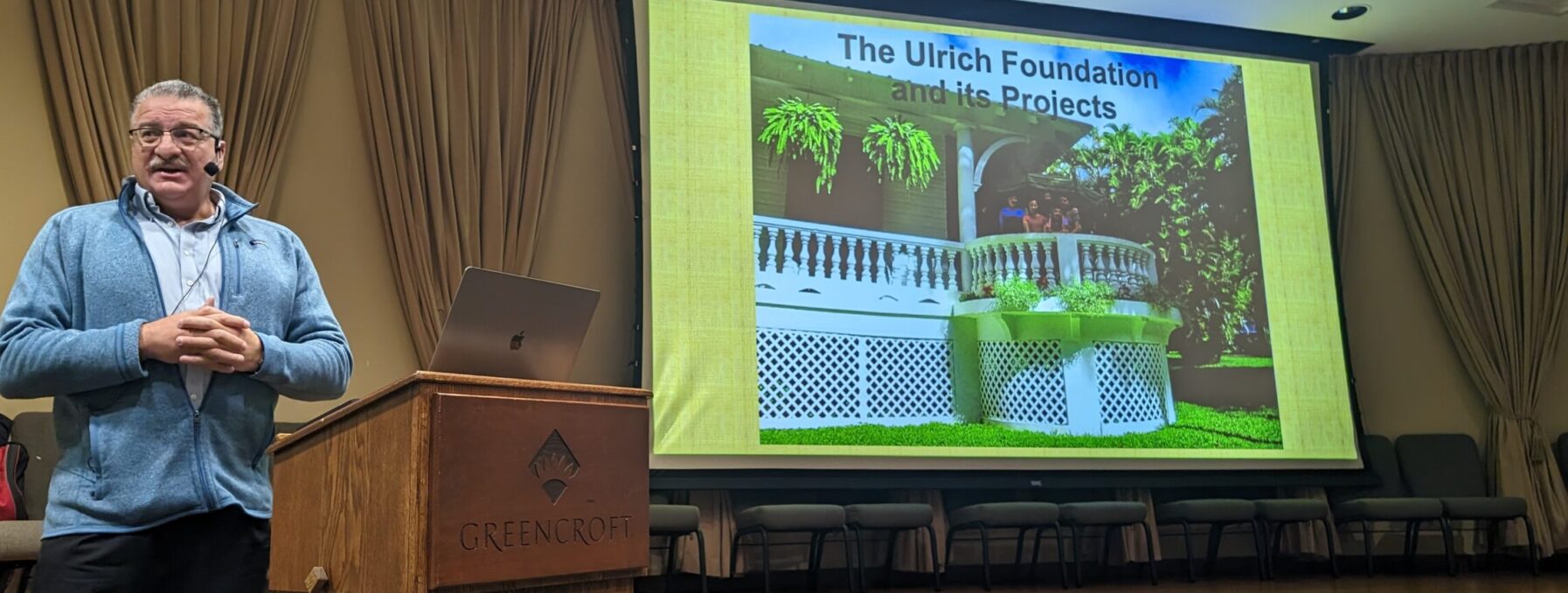In the very beginning, there was the Ulrich Foundation
Students were welcomed to the classroom by the sound of Música Cristiana Conservadora. At the front of the room behind an old wooden podium whose front adorned “Greencroft Communities”, stood Jim Alvarez, preparing for the day’s lecture. Today, Alvarez would host a Lifelong Learning session for seniors. Alvarez is the CFO of MHS Association’s newest member, Maple City Health Care Center, and serves on the board of long-time MHS Association member, Sistema de Salud Menonita, Puerto Rico’s largest hospital system.
The Lifelong Learning Institute of Elkhart County provides short courses for seniors throughout the county. Sponsored by Goshen College and MHS Association member, Greencroft Communities, the class being gathered for on this chilly December morning was “The Generational Impact of Mennonite Missionaries in Puerto Rico”.
Alvarez is a native of Aibonito, Puerto Rico. His upbringing intersected with the arrival of Mennonite missionaries in the early 1940s whose mission left an enduring multigenerational impact on the Aibonito community. Drawing on his own recollections and foundational transformations, Alvarez serves as the historical guide for what began as a mission to alleviate poverty that grew into the development of a thriving economy.

In the very beginning, there was the Ulrich Foundation. Contrary to the perception of missionary work as a short-term solution, Alvarez emphasizes that the Ulrich Foundation’s involvement was a “long-term investment” in revitalizing Aibonito, PR. This investment manifested in the construction of roads, enhanced access to employment and building materials, agricultural innovations, and more.

Alvarez shares that the Aibonito Dairy Farm, an Ulrich Foundation project started in 1954, was one of the first in the region to utilize artificial insemination. “The bull semen was flown in from Ohio but the plane would not land,” shares Alvarez. “It would fly overhead and parachute the semen into a field where men would stand waiting to receive it.” The class politely chuckled as the reality of what Alvarez had said sunk in. Upon video demonstration, however, laughter filled the room and students were bright with awe and surprise.
Today, many of the programs founded by the Ulrich Foundation still stand. For instance, the hospital, Sistema De Salud Menonita, is not only operational but thriving as a multi-site hospital system offering care for the Island, and Alvarez recounts working in the still operational egg factory as a young man (helped founded in part by his father, Antonio).

The development of land and industry had a long-lasting impact on the community. The Ulrich Foundation built upon four pillars that guided its mission:
- Better Living Through Better Agriculture
- Better Planning; crop varieties, land use, and adaptation to soil and climate
- Better Practices; conservation of soil, and better tillage and fertilizing
- Better Production; better calves through artificial insemination, and more milk through breeding, feeding, and care.
From extreme poverty to prosperity, the story of Aibonito is a testament to the Mennonite missionaries who dedicated their time and labor, and of the local community, who committed to change and new ways of thinking. Together, their work ensured the future of Aibonito for generations to come.
As in Aibonito, MHS Association Member volunteers and employees are a testament to the missions begun by their predecessors, most of whom were Anabaptist missionaries, churches, and conferences. Through our Members’ combined work, elders and people with disabilities, those who are unwell and injured, those who are unhoused, and those who need foster homes are provided healing, hope, and a caring community in the name of Christ.
